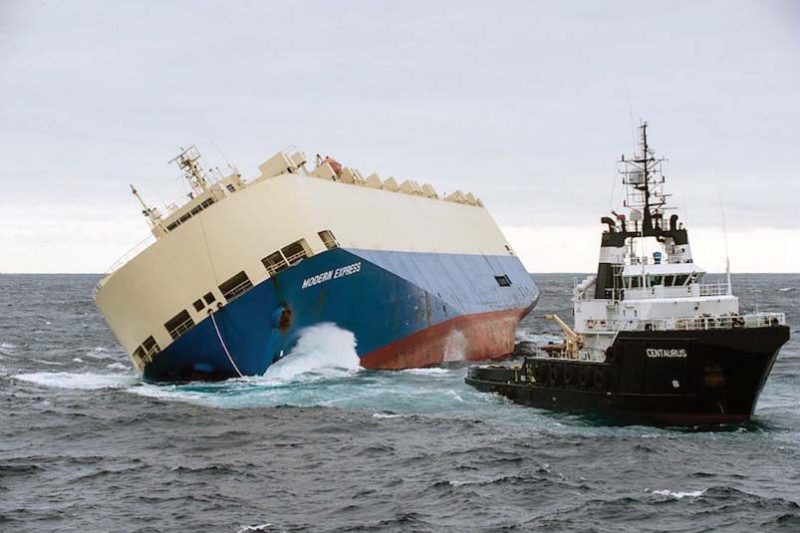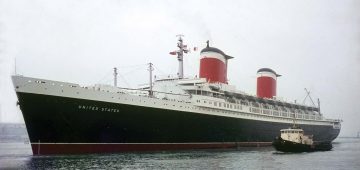The 33,831gt/2001 built and 164m long pure car carrier Modern Express went from anonymity to the global limelight on 26th January when the UK Coastguard in Falmouth picked up a distress call from the roll-on/roll-off cargo ship after she had lost stability in heavy seas in the western Bay of Biscay.
The ship, sailing from Gabon to Le Havre, was listing by about 40 degrees and in danger of capsizing further, requiring the evacuation of all 22 crew members. The Falmouth Maritime rescue Co-ordination Centre, in charge of co-ordinating the initial response, called on Spain to assist, dispatching search and rescue helicopters, aircraft and nearby ships to the Modern Express’s location. By the end of the first day, all 22 crew members had been hoisted from the deck in a risky operation carried out by two Spanish Sar helicopters with everyone being taken to shore without injury.
Severe weather played a central role throughout the salvage, making things difficult for everyone involved. The abandoned ship drifted eastward into French waters and the response was handed over to the French Navy and Maritime Prefect for the Atlantic on 27th January. The owners of the Modern Express, Cido Shipping, then hired Dutch salvage company SMIT Salvage to save the vessel before she came to further harm or was hit by another ship. The emergency towing vessel Abeille Bourbon, under charter by the French Navy, and the French frigate FS Primauguet, were also assigned to the scene.

By this time the wallowing PCC was drifting at a speed of 3 knots, reaching approximately 200 miles west of La Rochelle, France. The list increased to around 50 degrees. On 28th January a team from SMIT arrived on scene along with tugs Centaurus and Ria Vigo. The next day the ship continued to drift at 1 knot, the sea swell was 4-5 metres and a team of 4 from the salvage crew boarded the ship. An attempt to establish a tow line failed so the team were airlifted off again. The AHTS Argonaute also arrived that day with pollution prevention equipment in case it was required. Deteriorating weather and 6 metre seas saw the ship drifting at 3 knots again on 30th January and some 120 nautical miles from Gironde.
The Modern Express travelled a further 12 miles that day and a tow line attempt was hindered by the elements. By the end of 31st January the ship was positioned just 50 nautical miles west of the seaside town of Arcachon, France. A tow line was established to the tug Centaurus the next day, just as the threat of grounding seemed imminent. At the closest point, the Modern Express was just 26 nautical miles from shore when turned around by the tug.
The helpless ship was granted refuge in Bilbao and the tow proceeded at a cautious 3 knots. On 3rd February the stricken vehicle carrier was successfully towed into the port of Bilbao, following several days adrift in the Bay of Biscay. The ship was positioned alongside a quay and moored ahead of efforts to return her to an upright position. This is the biggest ever such operation organised by the port of Bilbao, one of the largest ports on Spain’s Atlantic coast.
The Modern Express was carrying excavators and 3,600 tonnes of timber from Gabon in West Africa to the port of Le Havre in Normandy, France when she ran into difficulties. Timber is not exactly routine cargo for a PCC but would have been carried in an attempt to boost revenue on a voyage. However, surely any benefits of this cargo are now lost following the tremendous salvage effort. Initial reports suggest that a ballast management issue caused the Modern Express to suffer her list, but only time will tell. Just a year prior to this incident the Hoegh Osaka suffered a near capsize in the Solent, only being saved by quick actions to ground her on Bramble Bank. The vessel then remained at a 40 degree angle when weather conditions refloated her but Salvage teams were able to right the ship again prior to a tow back to Southampton.

Another such situation affecting a PCC involved the Cougar ace in 2006 when she developed a 60 degree list 250 nautical miles off Alaska’s Aleutian Islands. All 23 crew members were rescued by the U.S. Coast guard, and the ship was eventually towed to safety and righted by Titan Salvage. The cargo of Mazda cars were all lost due to damage sustained. Once in port it emerged that the Modern Express was carrying a cargo of logs, not timber as mentioned in the manifest. Logs are prohibited from export from the West African nation. Gabon’s Ministry of Economy has launched an investigation.






Comments
Sorry, comments are closed for this item